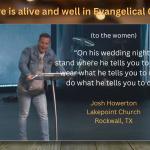 I know it is difficult for many to hear the information shared at the recent press conference in Salt Lake City in regards to the “protectldschildren.org” petition. We love our bishops. We love our church. We love our youth. It’s difficult in settings we are familiar with (whether in our own family systems or our church communities) to imagine that harm could be taking place. And yet all systems can improve and do better even when they do a lot of good to begin with. This is not an either/or argument… it’s a yes/and. Yes, youth in our church benefit from relationships with mentors and teachers such as bishops and other ecclesiastical leaders. And, youth in our church are at times abused by men in these positions or unintentionally sexually shamed by the process of worthiness interviews. These are statements that can sit at the same table. That speak to simultaneous truths. I found the following post on facebook by a woman who felt very vulnerable about sharing her support for this action. I asked her permission if I could share here as well. Anytime victims of sexual assault or sexual shaming are invited to be guests on this blog, I remind readers that I will be heavily monitoring the comments. It’s important to hear the stories that either resonate with our own… or give voice to a different experience than the ones we’ve had. This is how we learn from each other. This is how we support each other. This is how we help lift each other’s burdens.
I know it is difficult for many to hear the information shared at the recent press conference in Salt Lake City in regards to the “protectldschildren.org” petition. We love our bishops. We love our church. We love our youth. It’s difficult in settings we are familiar with (whether in our own family systems or our church communities) to imagine that harm could be taking place. And yet all systems can improve and do better even when they do a lot of good to begin with. This is not an either/or argument… it’s a yes/and. Yes, youth in our church benefit from relationships with mentors and teachers such as bishops and other ecclesiastical leaders. And, youth in our church are at times abused by men in these positions or unintentionally sexually shamed by the process of worthiness interviews. These are statements that can sit at the same table. That speak to simultaneous truths. I found the following post on facebook by a woman who felt very vulnerable about sharing her support for this action. I asked her permission if I could share here as well. Anytime victims of sexual assault or sexual shaming are invited to be guests on this blog, I remind readers that I will be heavily monitoring the comments. It’s important to hear the stories that either resonate with our own… or give voice to a different experience than the ones we’ve had. This is how we learn from each other. This is how we support each other. This is how we help lift each other’s burdens.
Today’s guest post is written by Jenn Adams. Opinions shared on guest posts may not completely reflect the positions of the blog’s author.
Jenn Adams grew up in the Mormon church and remained faithful and active through 1 marriage, 4 kids, 2 church disciplinary courts, at least 100 bishop’s interviews, 20 days spent in 3 different psychiatric wards, 1 divorce, and uncountable bowls of ice cream. She still lives in Utah, is raising her kids to be compassionate free-thinkers, and loves ice cream but rarely gets any before the kids eat it all.
I’ve wanted to post about this movement since I first found out about it, but I held back because I didn’t want to come off as unnecessarily or overly bashing the LDS church or its followers, many of whom are my friends and family. I also held back because it feels shameful to me still to talk about sexuality. But I keep feeling compelled because it’s an important topic to me, and one way to help break the shame is to talk about it openly.
I felt so much shame for most of my life for having sexual thoughts and feelings and for sometimes acting on those thoughts and feelings in ways that were outside of what I had been taught were proper ways to express them, both as a youth and as an adult. Especially since there were times in my life when there there was no proper way to express them. Just turn them off, push them down, put on your blinders, and pretend they don’t exist until some unknown day in the future when you might be married / married again. The shame that came from not being able to “overcome” those feelings no matter how hard I tried or how hard I prayed caused deep damage. I am just beginning to undo the damage this did to my psyche and I fear that I will never undo all of it.
I wish I could go back and reassure my younger self that I was ok just as I was. I no longer believe that a god would create us to be one way by nature and then command us to deny that nature and to self-flaggelate whenever we even have thoughts that are in line with the way that god created us to be. I also wish I could go back and stop myself from teaching my children to feel sexual shame. I wish I could stop myself from sending them into the bishop’s office to potentially be sexually shamed. This is nothing personally against any of my past bishops. None of them did anything egregious that I know of to me or my children, though that does happen. No, I believe all of my bishops were good men with good intentions. As Sam Young says in this press conference, most bishops probably are. Having a bishop who is a good person with good intentions, though, doesn’t stop the process itself from being harmful to healthy emotional and sexual development.
I understand that many of my Mormon friends might object to this movement and to my posting about it. And I understand why. As a Mormon, I thought the sexual shame I felt was a good thing. Now I see that it was not. It contributed in large part to my suicidal ideation over the years. Some people might think I shouldn’t talk about this because I’m no longer part of the church, but I’m not speaking up for myself or for my own kids. I’m speaking up because if this post saves even one child from going through what I went through, it will be worth it.
I didn’t realize that this kind of interview didn’t happen in other churches until recently. But now it just seems sensible to, at the very least, have a second adult in the room or a window in the door for the same reason there is two-deep leadership when meeting with minors at other times, whether that’s in a primary class or a scout campout or anywhere else. Sadly, we live in a world where abuse does happen and even if it’s rare, if one simple thing like this could be changed that would stop it, why not make that change?
Also, ever since I met Natasha Helfer Parker at Sunstone last year, she has been one of my heros. I appreciate your remarks at this press conference so much. Every time I talk to you or hear you speak, you say something that helps me heal. Thank you for everything you’re doing.
Sam Young is collecting stories of how this type of interview process has been harmful. Please feel free to share your stories on that website, to PM me on Facebook (even if we are not “friends” I check those messages), or share here in the comments section as well.
For Entire Press Conference: https://youtu.be/PF8BYINOny0
Natasha Helfer Parker, LCMFT, CST can be reached at natashaparker.org and runs an online practice, Symmetry Solutions, which focuses on helping families and individuals with faith concerns, sexuality and mental health. She hosts the Mormon Mental Health and Mormon Sex Info Podcasts, writes a regular column for Sunstone Magazine, is the current president of the Mormon Mental Health Association and runs a sex education program, Sex Talk with Natasha. She has over 20 years of experience working with primarily an LDS/Mormon clientele.












